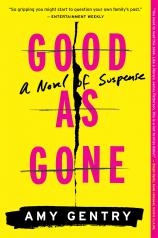Reading Group Guide
Discussion Questions
Good as Gone

1. When Julie comes home, Anna never expresses joy or even relief. Why? What do you think she is feeling, judging by the clues she drops in her first-person narrative?
2. At the end of the Prologue, Anna says, “And that…is the story of how I lost my daughter --- both of my daughters—everything, everything --- in a single night.” How does Julie’s kidnapping cause Anna to lose her other daughter, Jane? What else does Anna lose that night? Who do you think is responsible for these losses?
3. On page 44, Anna thinks, “I’ve already had the worst thing happen to me that can ever happen to a parent. And now, in a sense, Julie has too. It’s something we share.” What does she mean by this? What about her experiences and Julie’s experiences draw them together? Why doesn’t she feel the same closeness through loss with Jane?
4. When does Anna start to question Julie’s story and why? When did you begin to suspect that something about Julie’s story was off? What did you think when Julie first went for her hidden cell phone and ID stash?
5. When Anna speaks to Carol Morse, Julie’s therapist, she tries to get information in hopes it will shed some light on Julie’s lies. Carol explains that Julie’s “not sure how to relate to her family anymore, or to anyone who hasn’t been through what she has.” (p. 66) Do you think a person needs to have been through your exact experiences to understand them? How do you feel about Anna’s implicit accusation that Carol doesn’t understand her need because Carol isn’t a parent?
6. Julie literally takes a walk in Jane’s shoes when she sneaks out in the first chapter we read from her point of view. How else does Julie use physical objects to help her become someone else throughout the story? What do you make of Karen’s “trophies”?
7. On page 66, Carol tells Anna, “Many survivors of sexual abuse feel an overwhelming sense of shame.” Do you think this is true of Julie? How does it affect her behavior throughout the book?
8. The idea of keeping your children “safe” is a recurring theme in the novel. But what does “safety” really mean when a stranger can come into your home while you’re sleeping and take your child away? Do you think Julie and Jane were ever really safe ---are any of us? Discuss how else ideas about “safety” appear in the book.
9. On page 214, Anna says, “You’re my daughter” to Julie. Describe what is happening in this moment. What do you imagine is happening inside Anna that prompts her to say this?
10. What does Julie like about Charlie as they become friends? Discuss the unfolding of their relationship --- and “the Plan” --- and all that came after. How did it speak to your own fears, as well as to new fears developing in society at large over constant innovations and our changing digital landscape?
11. Julie concludes her telling, finally, of her side of the story with language that parallels Anna’s in the Prologue. Why do you think the author made this choice? How else are the two women’s experiences similar?
12. On page 267, Anna muses about “the good people” of the world, like Tom and Julie. Consider her thoughts in the context of Esther’s story about trying to be good, but not happy. What is the significance of that lesson for the characters in the novel?
13. Anna has a habit of using other people’s words, citing quotations from great writers rather than revealing herself with her own words. “All I have is other people’s words,” she confesses. What does she mean? (p. 274) Compare this to Julie’s habit of using other people’s identities. How else do people in the novel hide behind something, or otherwise protect themselves from being vulnerable?
14. Certain details of Julie’s kidnapping are similar to those of the real-life Elizabeth Smart kidnapping, which happened in Salt Lake City in 2002. Which details of the two cases are similar? Which are different? Do you think the resemblance is superficial, or are there real parallels between the two?
15. In so many ways, this novel is the story of Anna and Julie --- but what about Tom and Jane? They remain close to one another, but Anna is so distant from them both. Even Julie has become distant from Jane --- so young Jane recalls in the Prologue --- before she disappears. Discuss the ways in which the novel’s title “Good as Gone” applies to this story.
Good as Gone
- Publication Date: January 3, 2017
- Genres: Fiction, Psychological Suspense, Psychological Thriller, Suspense, Thriller
- Paperback: 288 pages
- Publisher: Mariner Books
- ISBN-10: 1328745554
- ISBN-13: 9781328745552








